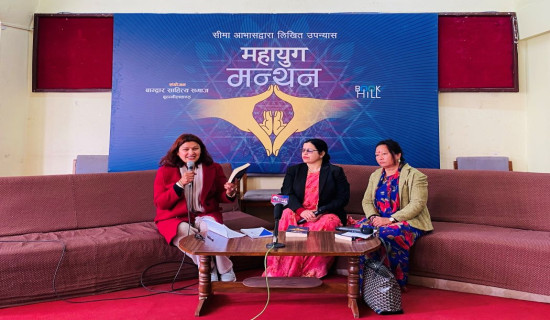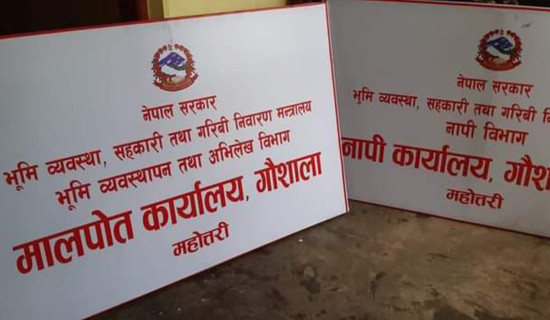- Monday, 2 February 2026
Balancing Tradition And Modernity In Parenting
Education is a key concern for many Nepali parents. Although access to schooling has improved in recent years, disparities in quality and resources persist, particularly between urban and rural areas. The emphasis on rote memorisation and exams can limit creativity and critical thinking. Parents should advocate for changes in the education system that foster well-rounded development and prepare children for today’s job market, which values innovation and adaptability. In Nepal's culturally rich and diverse landscape, the interplay between tradition and modern influences presents unique challenges for parents raising their children. As the country’s economy, society, and technology evolve, parents must navigate the complexities of raising children in a rapidly changing world. From managing the effects of globalisation to addressing the pressures of academic success, the journey of child-rearing in modern Nepali culture is intricate and demands careful attention.
One of the primary challenges parents face is creating balance between preserving traditional values and embracing modernity. Child raising in Nepali society today is a delicate journey that needs a careful balance of traditional values and modern influences. As globalisation continues to affect society norms and behaviours, parents have the difficulty of preserving cultural traditions while incorporating modern parenting approaches. This cultural contrast is visible in the shifting responsibilities of grandparents, who were formerly critical in conveying traditional beliefs but are now sometimes estranged due to changing familial dynamics affected by Western traditions. Despite these changes, it is acknowledged that both traditional wisdom and modern discoveries provide essential perspectives on shaping a child's identity and resilience. I
n the Nepali community, there was a culture, where grandparents could take care of their grandchildren and transfer the traditions and values, which helped children adjust to all age groups. But now, there is a mixed trend as parents try to follow western practices, and sometimes it has created a gap between grandparents and grandchildren.
Many Asian countries base their child-rearing practices on a variety of important beliefs that differ from Western approaches. Here are some fundamental lessons we learn from our homes, communities, and societies. For example, one of the first things we learn from our surroundings is to respect elders. Children should learn to respect and obey their elders, such as parents, grandparents, and teachers. This respect is conveyed through words (using respectful language) and actions). Second, collectivism: in many Asian cultures, the wants of the family or community take precedence over individual preferences.
Children are encouraged to consider how their actions affect others, think for others needs and preferences, and collaborate rather than focusing on or prioritising their own needs and competing intensely with their peers.
In today's world, child-rearing practices differ greatly, affected by cultural conventions, societal beliefs, and economic circumstances. Scandinavian countries, such as Sweden, Denmark, Finland, and Norway, are noted for their progressive practices, which prioritise early childhood education, gender equality, and promoting independence from a young age. It’s true that western culture also helps us explore new ideas, as new mothers can only choose what is suitable. Parents must navigate this cultural juxtaposition, ensuring that their children remain connected to their roots while also adapting to the changing world around them. These communities promote play-based learning and outdoor activities in order to develop well-rounded individuals who are resilient and socially capable.
Also, there is a heavy emphasis on parental leave policies and support networks, which ensure that both parents can actively engage in their children's development without jeopardising their employment. Such approaches highlight the significance of striking a balance between encouraging a child's freedom while yet providing a supportive, structured setting for their growth and development. It helps to foster the social, cognitive, language, and motor development of a child. The involvement of both parents with children is very important for child-raising to address a wider range of social experiences and networks.
Furthermore, the pervasive influence of digital technology poses both opportunities and challenges for child upbringing. On one hand, access to information and communication tools can enhance learning and connectivity. On the other hand, excessive screen time and exposure to inappropriate content pose risks to children's physical, mental, and emotional well-being. Parents must establish healthy boundaries around the use of technology, providing guidance and supervision to ensure that their children harness its benefits while mitigating its potential harms.
In addition to external factors, parents must deal with internal pressures like societal expectations and financial restraints. Nepali society places a high value on family and community harmony, frequently setting certain expectations for children's behaviour, professional prospects, and maintaining personal life. To balance these expectations with their children's specific aspirations and needs, parents must practice open communication, empathy, and support.
Addressing these challenges requires a collaborative effort from parents, communities, and government. Empowering parents with access to resources and support networks can help them negotiate the complexities of child upbringing more effectively. Additionally, investing in early childhood development, education, and social infrastructure can create more equitable opportunities for children across the country. By fostering a nurturing and inclusive environment, Nepal can ensure that its children thrive in the midst of modernisation while staying grounded in their cultural heritage. Financial condition is not a problem in everything but, of course, plays an important role in fulfilling a child's basic needs and developing their skills, creativity, and problem-solving techniques. We can also find alternatives and use locally available resources rather than being materialistic if financial condition is being a major hindrance in child raising and development.
In today's Nepali society, child upbringing shows a careful blend of tradition and modernity. As the country's social and economic landscape evolves rapidly, parents must balance the preservation of cultural values with the acceptance of new chances and challenges.
The traditional joint family system, once a source of support and direction, is rapidly giving way to nuclear families as a result of urbanisation and globalisation. This change provides both liberties and problems, as parents attempt to instill traditional heritage in the face of Western values and technology.
In conclusion, navigating the challenges of child upbringing in modern Nepali society requires a delicate balance between preserving tradition and embracing change. By addressing the multifaceted influences of globalisation, education, technology, and societal expectations, parents can create a nurturing environment that fosters the holistic development of their children.
(The author has recently completed an Early Childhood Development Course from Kathmandu University.)

















